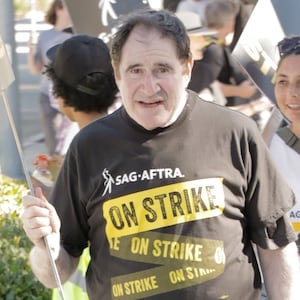As much as SAG-AFTRA appreciates the offer from high-profile members including George Clooney, Emma Stone, Ben Affleck, Tyler Perry, and Scarlett Johansson to provide funding over the next three years to help pay for benefits like health care, union president Fran Drescher says the offer won’t work because it would be illegal.
“First of all, I want to thank certain members that wield a lot of clout in this business for the tremendous amount of money that they contributed to our foundation on behalf of all the striking members that are in particular need,” Drescher said in an Instagram video posted Thursday night. “I also want to thank George Clooney for organizing the suggestion that we take the caps off of the dues so that the highest-paid members can contribute more. Although that’s extremely generous and we accept that graciously, that does not impact the contract that we’re striking over whatsoever.”
As a federally regulated labor union, Drescher said, “the only contributions that can go into our pension and health funds must be from the employer. So what we are fighting for in terms of benefits has to remain in this contract.” Drescher added that the actors’ suggestion to retool the residual structure to coax streamers back to the table “doesn’t hold water,” according to the union’s staff negotiators and lawyers.
“Although we appreciate the effort and the desire to be supportive to all the member body,” Drescher said, “we at the union and with the negotiating committee are still waiting for the CEOs to return to the table so we can continue our talks.”
Even if the measure were legal, however, saying “yes” would have been a mistake.
Earlier this week, the A-listers met with Drescher and SAG-AFTRA chief negotiator Duncan Crabtree-Ireland. According to Deadline, the group discussed why studios walked away from the bargaining table on Oct. 11. (The trade reports that AI and revenue sharing were “the major sticking points.”) Then, on Thursday, Clooney and company suggested that the union lift its cap on dues—a measure the actors reportedly hoped would help foot the bill for union benefits. They also suggested reversing the order in which studios pay out residuals, ensuring that lowest-paid workers get paid first.
“A lot of the top earners want to be part of the solution,” Clooney explained to Deadline. “We’ve offered to remove the cap on dues, which would bring over $50 million to the union annually. Well over $150 million over the next three years. We think it’s fair for us to pay more into the union. We also are suggesting a bottom-up residual structure—meaning the top of the call sheet would be the last to collect residuals, not the first.”
Clooney acknowledged that the “negotiations will be ongoing, but we wanted to show that we’re all in this together and find ways to help close the gap on actors getting paid.”
But what would it have meant for the union to move forward with his broader idea, which essentially lets studios off the hook?
On Thursday, writer and critic Andy Greenwald, who is not a member of SAG-AFTRA, voiced a key issue with this idea on The Watch, the podcast he co-hosts with The Ringer’s Chris Ryan. Although he, like Drescher, praised the actors for doing what they can to take care of their industry, he also said that “bigger picture… I still feel like we shouldn’t be here.”
“I think that the AMPTP [the Alliance of Motion Picture and Television Producers, which represents Hollywood’s major studios]—especially certain members—have the money to make SAG solvent,” Greenwald said. “...This is the fancy, star-studded equivalent of a GoFundMe for medical expenses. It’s so nice that people are doing those things; we shouldn’t have to do that in a functioning democratic capitalist society, but here we are.”
On Friday, The Hollywood Reporter offered further context as to how the talks suddenly broke down: SAG-AFTRA’s latest proposal would reportedly charge individual streamers a fee each quarter, calculated by multiplying their total global subscribers by the percentage of viewed content covered by the guild. The studios told THR that SAG-AFTRA initially proposed a fee of $1 per subscriber per year, and now, the union tells the trade magazine, the total cost of its current proposal would amount to less than 57 cents per subscriber per year, taking into account non-unionized shows’ viewership.
“From our point of view, there ought to be a sort of base level compensation for the contribution that our members are making to the existence of these platforms, to building these platforms,” Crabtree-Ireland told THR. “And frankly, in light of their overall revenues, we think that this number makes sense in the context of the industry. And we think what’s being paid now in terms of streaming residuals is absolutely far too low.”
THR estimates that under this proposal, the studios would collectively pay out $500 million per year; and Netflix CEO Ted Sarandos reportedly called the proposal “a bridge too far.” Crabtree-Ireland told the magazine that he’d invited the studios and the AMPTP to counter with their own figure before they halted negotiations.
USC Marshall School of Business adjunct professor Sanjay Sharma told THR that from his perspective, $500 million doesn’t seem like an “untenable economic burden” for studios. “If you look at Netflix’s production costs right now, we are at about $16 billion,” he said. “So from that perspective, $400 million is an Avatar[-type] production cost, or one blockbuster movie that did not work.”
While SAG-AFTRA waits for studios to return to bargaining, the high-profile actors who approached their union’s leaders were reportedly looking for a way to get studios back to the table faster. On Thursday, SAG-AFTRA negotiating committee member David Joliffe told Variety that he planned to speak with Clooney himself. “We appreciate everybody’s help,” he said. “Everybody has ideas. But we’ve been doing this for almost a year now.”








